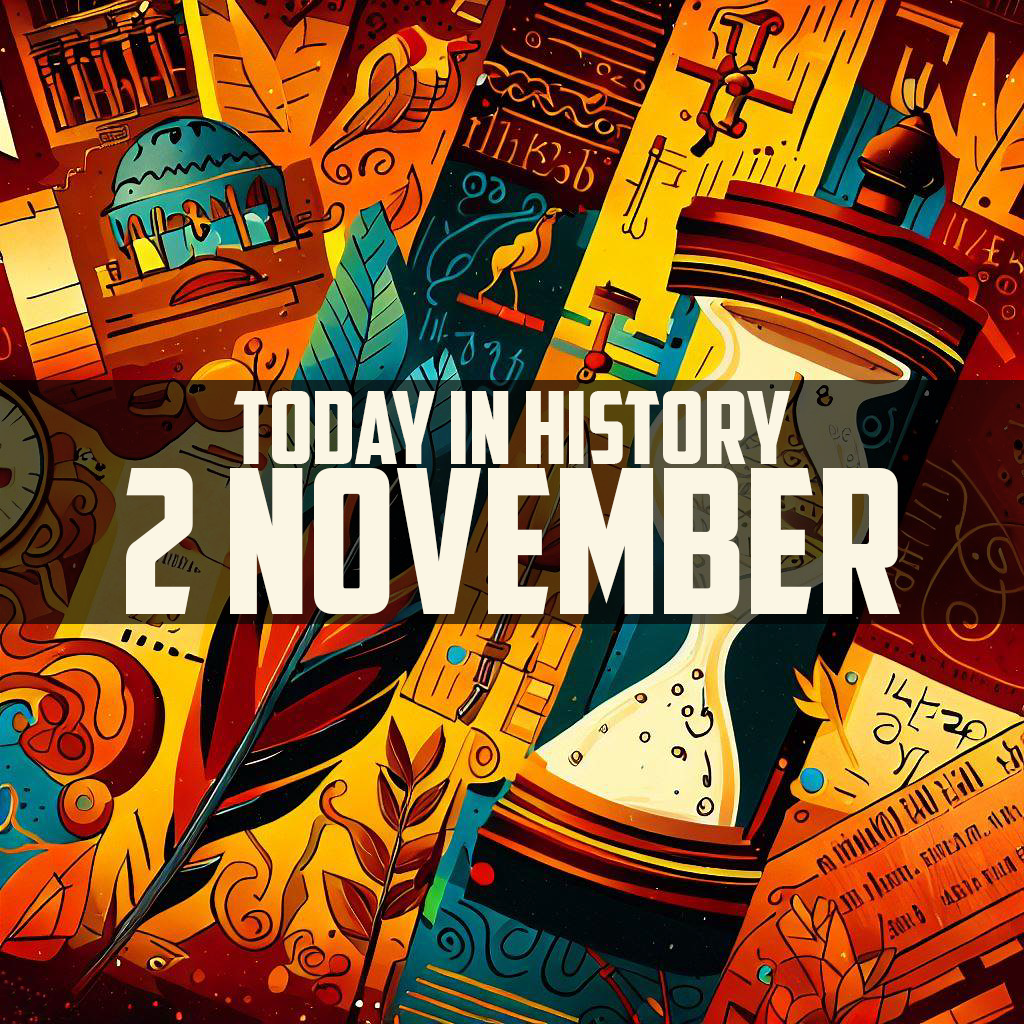November 2nd is a day replete with significant historical events, from innovations in science and technology to shifts in geopolitics and culture. The following sections explore some of these pivotal moments that have unfolded on this day.
Today in History: 2 November

1. All Souls’ Day – Honoring the Departed:
November 2nd is a day that holds religious significance, being observed as All Souls’ Day by many Christian denominations. On this day, the faithful remember and pray for the souls of the departed, particularly those in purgatory awaiting their journey to heaven. The tradition is marked with church services, candle-lit processions, and visiting graveyards to honour the dead.
2. 1889 – North and South Dakota Enter the Union:
On this day in 1889, both North Dakota and South Dakota were admitted to the Union as the 39th and 40th states, respectively. Originally part of the Dakota Territory, which included parts of present-day Wyoming and Montana, the decision to split it into two states was primarily driven by economic and political considerations.
3. 1917 – Balfour Declaration:
A declaration that would play a pivotal role in the creation of Israel, the Balfour Declaration was issued on November 2, 1917. Arthur Balfour, the British Foreign Secretary, wrote a letter to Lord Rothschild, a leader of the British Jewish community, expressing the UK’s support for a “national home for the Jewish people” in Palestine. This declaration became a foundational text for the Zionist movement but also became a point of contention in the Arab-Israeli conflict.
4. 1920 – First Commercial Radio Broadcast:
Pittsburgh’s KDKA Radio made history on this day in 1920 by broadcasting the results of the U.S. presidential election, marking the first commercial radio broadcast. This event signified the birth of a new mass medium that would shape the 20th century, transforming news delivery, entertainment, and global communication.
5. 1930 – Haile Selassie Crowned Emperor of Ethiopia:
On November 2nd, Haile Selassie, formerly known as Ras Tafari Makonnen, was crowned the Emperor of Ethiopia. His reign lasted until 1974, and he became an iconic figure in Rastafarianism, which regards him as a messianic figure.
6. 1936 – BBC Television Service Launches:
The British Broadcasting Corporation (BBC) launched its regular television service on this day, making it the world’s first regular TV service with a high level of resolution. The early broadcasts included news, drama, and entertainment, laying the foundation for the future of television programming.
7. 1947 – Howard Hughes’ Spruce Goose Takes Flight:
One of the largest aircraft ever built, the Hughes H-4 Hercules, popularly known as the “Spruce Goose,” made its first and only flight on November 2, 1947. Financed and led by business magnate Howard Hughes, the massive wooden seaplane was a marvel of engineering, though it never went into production.
8. 1959 – Quiz Show Scandals Lead to U.S. Legislation:
Following revelations about rigged quiz shows on television, President Dwight D. Eisenhower signed the amended Communications Act into law on November 2, 1959. This legislation sought to prevent deceptive practices in broadcasting, ensuring honesty and transparency in TV and radio programs.
9. 1965 – Norman Morrison’s Protest Against the Vietnam War:
A significant event during the anti-Vietnam War movement, Norman Morrison, a Quaker, set himself on fire outside the Pentagon office of Robert McNamara, the U.S. Secretary of Defense. His act was a protest against the U.S. involvement in the Vietnam War and drew widespread attention.
10. 1983 – U.S. President Ronald Reagan Signs a Bill to Honor Martin Luther King Jr.:
In a landmark moment for the U.S. civil rights movement, President Ronald Reagan signed legislation on November 2, 1983, to create a federal holiday in honour of Martin Luther King Jr. This day is now observed on the third Monday of January every year, celebrating the life and achievements of the civil rights leader.
11. 2000 – International Space Station Welcomes its First Crew:
November 2, 2000, marked a significant milestone in space exploration when the first crew boarded the International Space Station (ISS). The ISS has since served as a hub for international scientific research, collaboration, and understanding in space.
12. 2016 – Chicago Cubs Win the World Series:
Ending a 108-year championship drought, the Chicago Cubs won the World Series on November 2, 2016, by defeating the Cleveland Indians. The victory was an emotional moment for generations of Cubs fans and became a landmark event in American sports history.

In Conclusion:
November 2nd encapsulates a rich tapestry of events, ranging from scientific advancements to cultural shifts and political milestones. Each year, as the world reflects on these moments, it becomes evident that history is not just a collection of dates and facts but a narrative of humanity’s progress, challenges, and aspirations. Through events like these, we gain insights into the decisions and breakthroughs that have shaped our past and continue to influence our present and future.
